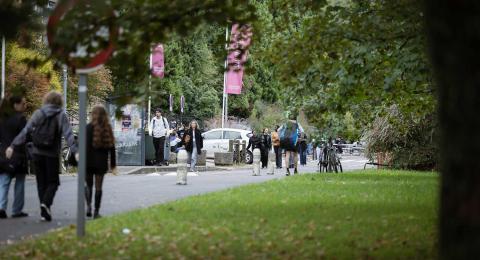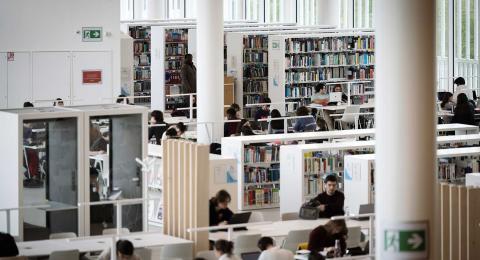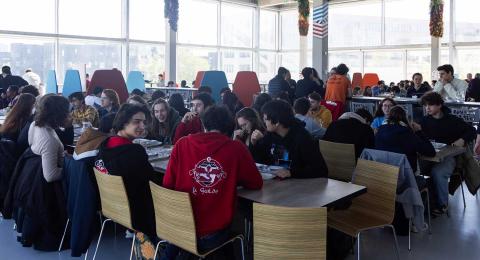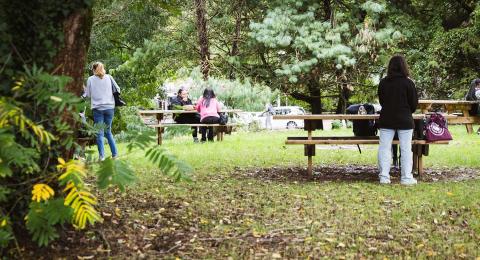Bioceb (European Master in Biological and Chemical Engineering for a Sustainable Bioeconomy) is a 2-year joint master's program that trains future research and innovation managers to tackle the challenges related to the deployment of the bioeconomy worldwide. It addresses the needs of the growing bio-based industry sector for scientists aware of the markets and socio-economic contexts.
Bioceb arises from an interdisciplinary approach that combines chemistry, biology, economics, and environmental sciences, with cross-cutting skills including project management. Its modular construction promotes a cultural mix between students from different regions of the world and with various educational backgrounds. Bioceb was labelled “Erasmus Mundus Joint Master Degree” (EMJMD) by the European Commission in 2019 and renewed in 2025. The Master 1 Biomass Engineering for Bioeconomy (BEB) is part of the EMJM Bioceb, which is offered by a consortium of five European universities: Institut national des sciences et industries du vivant et de l’environnement (AgroParisTech)/Université Paris Saclay, Université de Reims Champagne-Ardenne (URCA), Université de Liège (ULiège) Belgium, Aalto University, Finland, Tallinn University of Technology (TalTech), Estonia.
Information
Skills
Scientific and technical skills:
● Double chemistry-biology competences, including knowledge of the principles of green chemistry and associated metrics, plant science with awareness of biodiversity, and disciplinary knowledge in biochemistry, molecular biology, and microbiology;
● Skills in process and materials engineering applied to biomass production and conversion into bio-based products and energy;
● Capacity to implement integrated multi-disciplinary approaches in order to design new sustainable routes for the valorisation of agro-resources or industrial waste;
● Skills in carrying out experiments in a scientific research approach for bioeconomy-related projects
Knowledge in environmental analysis: Knowledge of sustainable and cleaner production routes, Life Cycle Analysis (LCA) and applying green chemistry metrics leading to sustainable manufacturing in line with circular economy objectives;
Competences in socio-economics sciences: Awareness of the global diversity of bioeconomy models and biorefinery systems (biomass, transformation strategies and end-products markets) and their relationships with territories; understanding of the techno-economic and legal constraints associated to the development on bio-based products and bioprocesses;
Management skills:
● Skills in project engineering with knowledge of innovation processes and of the different stages leading to industrialization from the laboratory research step (technological readiness levels);
● Soft skills: ability to discuss with people from different cultural backgrounds and take into account social and ethical expectations, to interact within a group and exploit the diversity of skills to build up and carry out a project, to communicate and disseminate scientific results, to take risks and address challenges.
Objectives
The joint first semester (S1) at URCA provides a multidisciplinary scientific knowledge base and a shared culture in the field of agro-resources and their conversion through biorefinery processes. The second semester (S2) allows the students to enrich their technical and scientific experience with cross-cutting approaches dealing with value-chain sustainability assessment, with a specific focus either on economics (AgroParisTech) or on green chemistry principles (TalTech). The third semester (S3) offers a specialization in one of the key biotechnology approaches of bioeconomy: biomass engineering (AgroParisTech), bioprocesses (ULiège) and bio-based products (Aalto). The fourth semester (S4) is dedicated to a R&D internship leading to a Master’s thesis preparation and defence. The M1 BEB only includes Bioceb students spending the second semester in AgroParisTech. The M1 Biomass Engineering for Bioeconomy is delivered by the Université Paris Saclay and operated by AgroParisTech.Bioceb aims at providing top-level and up-to-date education in chemical and biological engineering applied to the design and development of bio-based products and processes. The objective is to provide all students with a solid multidisciplinary scientific background in biology, chemistry, and biotechnology, combined with a good knowledge of bio-based products markets, and value-chain sustainability assessement. Bioceb aims at training students to systemic approaches at different scales, from the biological cell to macroeconomic systems.The programme is built-up arround three key pedagological pillars: an academic programme (lecture and practice), a green-line multidisciplinary project carried out over the 2 years, and an internship. Bioceb has the ambition to favor the graduates' insertion in the professional world through a cross-cutting approach related to innovation, entrepreneurship, and dissemination. Thanks to Bioceb modular format, each student is allowed to build-up his/her specific curriculum with a specialization in one major field of biotechnologies, among bioprocesses design and up-scaling, biomass engineering and valorization, bioproducts design and production. In this context, the objectives of the M1 Biomass Engineering for Bioeconomy is to provide knowledge on agro-resources and biorefinery combined with skills in value chain sustainability assessment and economics.
Career Opportunities
Career prospects
Après Master + Doctorat : chercheur ou enseignant-chercheur
Après un Master ou Master + Doctorat : ingénieur (recherche-développement, contrôle, production…) dans les domaines santé, pharmacie, agroalimentaire, biotechnologies, instruments et réactifs, cosmétique, dépollution et environnement
Further Study Opportunities
Biologie-AgroSciences
Cette orientation prépare en particulier aux activités de recherche appliquée, généralement exercées après un doctorat, que ce soit dans le milieu académique ou en R&D.
Les étudiants de cette mention peuvent se tourner vers la recherche à l’issue du M2
Master Biologie-AgroSciences
Fees and scholarships
The amounts may vary depending on the programme and your personal circumstances.
Admission Route
Capacity
Available Places
Target Audience and Entry Requirements
The Master Bioceb is a two-year EMJMD (M1+M2). Consequently, the students applying for the M1 commit to follow the M2. This Master comprises the track "Biomass Engineering for Bioeconomy" (BEB) of the University Paris-Saclay national Master Biologie, AgroSciences. The admission requirements for Bioceb are the following:
• BSc degree or equivalent degree of at least 180 ECTS in Engineering or Science, including a strong background in at least one discipline related to Biology: Biotechnology, Biochemistry, Microbiology, Biophysics, Bioprocess engineering, Molecular biology
• Preferred but non-mandatory: a complementary background in Chemistry, Physics, or Environmental sciences
• Demonstrated English language proficiency
- B2 advanced. The candidates are selected according to the excellence of their background and academic results as well as their motivation (professional project). The M2 BEB is open to non-Bioceb students.
Application Period(s)
From 01/01/2026 to 29/01/2026
Supporting documents
Compulsory supporting documents
Copy diplomas.
Copy of passport.
Supporting documents (TOEFL, TOEIC, certificate of a teacher ...) of a level of a foreign language.
Motivation letter.
Letter of recommendation or internship evaluation.
List of the last 5 years of studies mentioning only the year of study, the institution, the overall average and the mention obtained.
All transcripts of the years / semesters validated since the high school diploma at the date of application.
Curriculum Vitae.
Additional supporting documents
VAP file (obligatory for all persons requesting a valuation of the assets to enter the diploma).
Supporting documents :
- Residence permit stating the country of residence of the first country
- Or receipt of request stating the country of first asylum
- Or document from the UNHCR granting refugee status
- Or receipt of refugee status request delivered in France
- Or residence permit stating the refugee status delivered in France
- Or document stating subsidiary protection in France or abroad
- Or document stating temporary protection in France or abroad.










